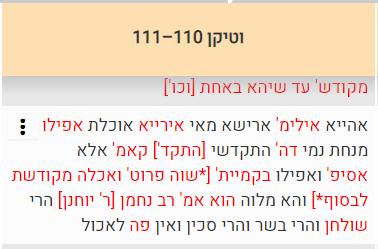Missing a Mouth
Continuing our analysis of Kiddushin 46, we encounter:
וַאֲפִילּוּ בְּקַמַּיְיתָא? וְהָא מִלְוָה הִיא! אָמַר רַבִּי יוֹחָנָן: הֲרֵי שֻׁלְחָן, וַהֲרֵי בָּשָׂר, וַהֲרֵי סַכִּין, וְאֵין לָנוּ [פֶּה] לֶאֱכוֹל!
The Gemara proceeds to ask: And is she betrothed even if the first date is worth one peruta? But until he has given her all the dates for the betrothal, each individual date is considered to be a loan, because if he were to retract his betrothal before giving her all of the dates she would have to return them to him, and one cannot betroth a woman by giving her a loan. By the time he finishes giving her the dates, the first one has already been eaten, so it is not able to effect the betrothal. With regard to this difficulty Rabbi Yoḥanan says: There is a table, and there is meat, and there is a knife, and we have nothing to eat. In other words, everything in the mishna is explicit yet we cannot explain it.
It is interesting that they put the word peh in brackets to include it, drawn from some other source. But in the English translation, no mention is made of mouth. This follows Rav Steinsaltz’s Hebrew commentary:
אמר ר' יוחנן כאשר עיין בקושי זה שבמשנה: הרי שלחן, והרי בשר, והרי סכין — ואין לנו לאכול. כלומר, לכאורה הכל מפורש, ואולם איננו יכולים להסביר את הדברים.
The Bach is the one who inserts the word peh. And indeed, this matches all the manuscripts at Hachi Garsinan. (The printings other than Guadalajara lack it.)
This should then read: “and we lack the mouth to eat it”.




